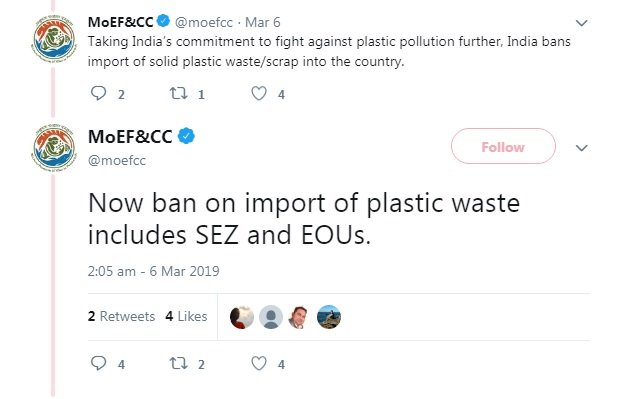
Taking into consideration the grave environmental issues created by the use of plastics made from imported plastic scrap, the Indian government has put a complete ban on the import of solid plastic waste. According to an official data, India produces about 25,940 tons of waste from plastics every day.
Tamil Nadu banned the use of single-use disposable plastic items in January 2019. The ban in the state is part of an ambitious national campaign to get rid of plastic waste. While hosting the United Nations’ World Environment Day in June 2018, Prime Minister Narendra Modi announced the central government’s intention to eliminate single-use plastic by 2022.
The Ministry of Environment, Forest and Climate Change (MoEFCC) in a media release stated, ‘In order to strengthen the implementation of environmentally sound management of hazardous waste in the country, the Ministry of Environment, Forest and Climate Change has amended the Hazardous and Other Wastes (Management & Transboundary Movement) Rules, 2016. The amendment has been done keeping into consideration the “Ease of Doing Business” and boosting “Make in India” initiative by simplifying the procedures under the Rules, while at the same time upholding the principles of sustainable development and ensuring minimal impact on the environment.’
Among other regulations, the MoEFCC order has specifically mentioned, ‘Solid plastic waste has been prohibited from import into the country including in Special Economic Zones (SEZ) and by Export Oriented Units (EOU).’
It is noteworthy that in 2009 Himachal Pradesh became the first Indian state to ban plastic shopping bags. Delhi, the national capital of India, followed suit in 2017 by banning plastic bags, cups and plates, and single-use cutlery.
India’s 29 states and 7 union territories in some form had been trying to discourage the people from using single-use plastic items. Despite all government initiatives,we are yet to see any significant result. The most common form of restrictions implemented by the governments had been the ban of thin plastic shopping bags. Currently, state governments are working to reduce the manufacturing of plastic by shutting down factories and preventing import of plastic products.
India being the lowest consumer of plastic recycles only about 4 million tons. To incentivize domestic plastic recycling units, the government had banned the import of plastic waste, particularly PET bottles, in 2015. In 2016, an amendment allowed such imports as long as they were carried out by agencies situated in SEZs.
The latest move came in the wake of substantial increase in imports of solid plastic scraps. Experts believe that the lack of a proper segregation system and waste collection is the main reason behind challenges posed by the plastic industry.











